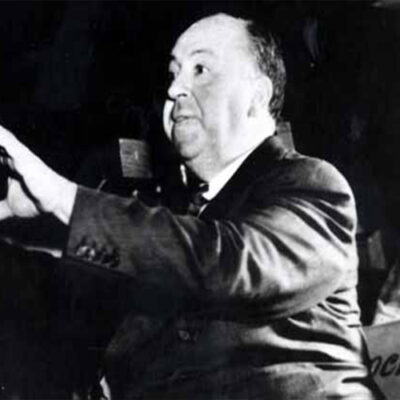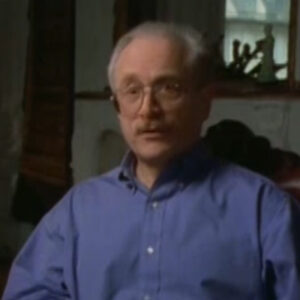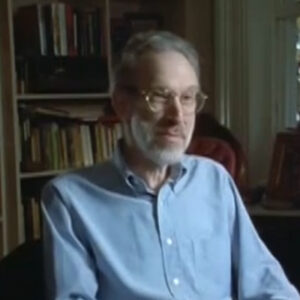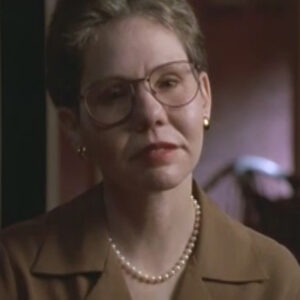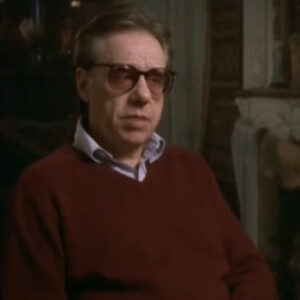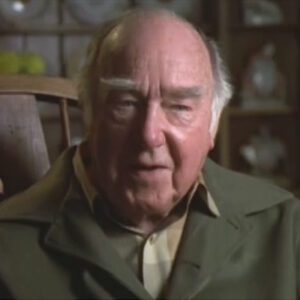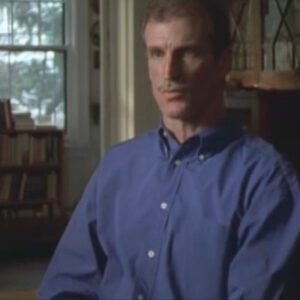Interviewer: So, Mr. Herschel, what was it like to go to the movies in New York as a child? Did you go very often?
Al Hirschfeld: Oh, yes. It was a ritual, actually. I went to the movies. Our family usually go to the movies on Thursday night and before it was considered an art form. It was the form itself became so fascinating just to see the objects move. And it was called Movie Night Did Families went on Churton night, too. And it was a Nickelodeon tensions. Twenty five shots. But I remember we went one evening and shut down and my mother said, well, we’ve seen this film before, you know. And we went to the manager and he said, okay, come back next week. And that was that. And you didn’t go to see a particular picture. You went to the movies.
Interviewer: Were there people that you cared about? Did you. Did you care about the filmmaker?
Al Hirschfeld: Oh, yes. Chaplin films became a ritual, you know. I think they came out on a Tuesday night. I think it was. I think it was Tuesday. Do you have the Chaplin films new to real or every week? You know, one of those.
Interviewer: Was there a particular theater that you your family went to?
Al Hirschfeld: Yes, the Audubon Theater in Washington Heights. It’s still there, I think. I don’t know what it’s called now, but. Well, like everything changes in the form, changes completely and has relation to what the movies were of them. I mean, the thrill of seeing the movie changes. I remember Reagan years. My wife and I came back from a long trip. We’d been away for about a year or so and we had seen no movies. And we’re walking down Broadway past the revelry and for whom the Bell Tolls was playing there. And we wanted to share that. And I sat down here I am confronted with two hej with eyeballs 20 feet in diameter on top of a mountain somewhere in Spain and a whole symphony orchestra playing in the background. I started laughing and people were shushing me all around. They were very involved in this, you know. Well, within two minutes the form changed. I got accustomed to it. The head, your normal serzh, I didn’t hear the orchestra, the whole thing. You’d get custom tools very fast, you know, quickly.
Interviewer: When you know, mid teens. That was was Lewis Selznick a name that the average New Yorker would know?
Al Hirschfeld: Well, I don’t know what they mailed because he certainly had more advertising than any other commodity on Broadway. I think there was something like 22 shows like Short-Change on Broadway. I don’t know whether he was known personally as a movie personality, but they certainly know the name shows like, you know, a household word. I mean, really.
Interviewer: They billboards. You know, I haven’t seen very many pictures of it.
Al Hirschfeld: So although electric signs and billboards and so many corporations were shelved make news themselves like pictures and select pictures going on and on. You know.
Interviewer: Selznick pictures make happy hours, right? That’s right. So what was Lewis Selznick like? Was he a quiet? Was he reserved?
Al Hirschfeld: Well, he was known after. Well, he was. He knew the business. He he was a great entrepreneur and a great film maker. And when they went bankrupt, I was one of the creditors because I was art director and I had hired all of the artists that were working for shelf like we’re now under my control. And so they owed me an awful lot of money. And I remember meeting with powers who had the power as a engraving company and other creditors. And we all agreed that to let Charles release those two feature films that he’d made, he had an idea. Rupert Henshall and the Common Law were the two of first all star films. Lane Hammerstein, I had ever everyone. There were all stars. And they were going to release those pictures like a theatre performance at a certain time. You had to get and you couldn’t come in the middle of the film and they charge and you had a whole thing shut up. But has lately become, of course, normal. But all those years, it was unheard of. And the backers Musharraf huge foreclosed on before he had a chance to release those two films. And they’ve just released them as ordinary films. And that that was the end of the Selznick pictures.
Interviewer: He didn’t get a chance to release them.
Al Hirschfeld: No, as as the primary are a thing, you know.
Interviewer: You know, if we can go back to what it was like to work for Selznick, you walk in in the morning. What was the harm of the place like? Help me just paint a picture of that with the hum of the Selznick’s studio.
Al Hirschfeld: Well, the shelving studio is. Like all studios, those places inhabited by Lola texturally, you know, I mean everyone, they’re carrying their ego too extreme, you know, and. But it wasn’t an amiable atmosphere, I thought, at the time.
Interviewer: You know, Lewis Selznick described the man from good was kind.
Al Hirschfeld: Yes. Very, very liberal. Very amenable to new ideas. He was not shocked by any new idea. Know. Very enterprising. Wonderful filmmaker that he and his sons inherited. And actually, you know.
Interviewer: Was he a very conservative spender or was he a very conservative man?
Al Hirschfeld: Oh, a lot. I wouldn’t know yet. I don’t know about his expenditures, but he lived very well, kept a lovely apartment.
Interviewer: Did you ever visit the apartment?
Al Hirschfeld: Oh, yes. And wonderful dinners there, you know, and he was a wonderful host.
Interviewer: Do you think. Well, how about David? Was he anything like his father with the same kind of force?
Al Hirschfeld: No, no. David also was very creative in another way. You know, he was well on the back of Jay took place. David. Became furious with the whole motion picture industry, and so he went off to California to make his fame and fortune on his own. You know, without any help from his father, except his name was so well-established that I have shown that was no handicap in any way. And I must say, he did a remarkable job up there. You know, he went out there. He was about 19, I think, or 20 around there, maybe a little older. He and Sharmarke, who later became the head of the star department at MGM. They went to school together and Sam went out there. And on the day he arrived, he got a job.
Interviewer: What was David like when you knew him in New York? Was what was. Help me understand. A young David Selznick.
Al Hirschfeld: Well, he was not different, Carol, of late than most the teenage kids, you know, except he was ambitious and he had the glamour of the being in the motion picture industry that most kids didn’t have, you know, show he was shot after socially. And Myron Howard was the weak one of the three. You know, he was not really creative at all. I mean.
Interviewer: When you go out to dinner with David, do you split the check?
Al Hirschfeld: Yes. Yeah. Yeah.
Interviewer: Good talk. Or a friendly guy. Yeah.
Al Hirschfeld: Friendly and full of creative ideas. Very stimulating fellow to feel, you know. Now we’re flouted to the fact that they were Moghuls in the motion picture industry. No, never. He never traded on that in any way.
Interviewer: But he clearly learning his craft.
Al Hirschfeld: Always did indeed. Help me understand. Well, he watched what was being done and apparently absorbed this knowledge very knowingly and consciously. He was destined as a very young man to go into the motion picture industry. And it was one of the great limitations, like an all art and design and anything else. You know, if you have that limitation, you can’t do anything else. And you concentrate on one thing. You might develop as a talent for, you know, you’re right out of luck. You’ll get your talent for it.
Interviewer: Do you think David and Lewis were very close? Were they? Was it a good father son?
Al Hirschfeld: Yes. Good relationship between them, you know, between the brothers till until later in life. Myron took to drinking too much. Did you like Myron? Did you? Not as much as David, actually. And Myron was an explosive character, you know, unpredictable, very friendly. One of them next month. He was often left field, you know, wondering too many, any irresponsible. But he was an excellent agent. You know, he the business, as well as David Miller, the production that shouldered Myron and Myron concentrated all of his creative efforts to testing. And she’ll be joining the tour. They had kind of a pact on an industry going because David would use Myron’s casting agency.
Interviewer: And Myron had one side of Hollywood. That’s right. I’ve had the other. That’s right. You know, I didn’t want to talk with you a bit about Lewis’s failure again. OK. Let’s let’s cut. So where would you go with David and what was a nice evening out with David Selznick?
Al Hirschfeld: Well, there was a German restaurant on 44 Street, the blue ribbon, and specialize in German dishes and things. And we both like that kind of cooking. So we would have dinner there and talk about theater and movies and that sort of thing.
Interviewer: Who were the kind of people that would hang out with the blue ribbon?
Al Hirschfeld: Well, a lot of artists, writers and people in the theater. It was a kind of forerunner of Saudis, you know. You’d go there and meet friends. You know, Menken, Nathan would come. And there are people of that nature. And it was a pleasant place. And the price was right on. The food was excellent.
Interviewer: What was the name of.
Al Hirschfeld: The the blue ribbon.
Interviewer: Yeah. Was David. Sort of tight with the checks when they would come.
Al Hirschfeld: No, no, no, no, never any discussion about that. Really? That I remember. No, it was very generous, as was his father. Really? When they wanted something they never argued or heckled about. They just want to get it. And they paid for it. And that was that.
Interviewer: Describe Lewis, Selznick’s coming into the office. If you can’t see the extent that you remember coming in the opposite.
Al Hirschfeld: Well, I had one when he would come into the office. He wasn’t there all the time. He was in Europe a lot. And in California, when the studio moved to California, he was stationed out there a lot in the early days of the Warners used to have a studio in the Bronx and shelves and had their studio in Fort Lee in Jersey. And so he would the. Well, he was more on the entrepreneurship, really, you know, an awful lot of things that I didn’t know about that. I had no familiarity with the mike, so I couldn’t comment on them, I don’t know what he was doing on it, but.
Interviewer: I realize that when he would, he would kind of work. We drive up in a nice car with each.
Al Hirschfeld: Oh, yeah. He had a lovely car and a chauffeur, you know, and he would drive to Fort Lee or to 729 Seventh Avenue and come into the office. And he was very amiable and everyone seemed to like him very much. Most of the employees that were there for years. You know, Ruth Weisberger, I remember, was head of the still department and she was there from the very beginning.
Interviewer: Everybody started looking at the car. What did you what what what did you do? Why were you working at Lewis Selznick’s place? Mr. Shaw, what what what did you do? Why were you working at a place?
Al Hirschfeld: While I was there, I was in the art department doing drawings for advertising. And one evening the old LJ said to me, listen, why don’t you take over the art department, open your own studio, and we will give you all of the work that we normally do and do your. Why should sound marvelous. So I took a studio on Fifty Third Street and I hired all of people that were hired by the shell companies. And after the second month, I got a trade acceptance for half of the amount that I owed and. Try to cash that. I couldn’t cash in, of course, the following month, another trade acceptance and the third month they went bankrupt and showed they owed me an awful lot of money. And I took a job at Warner Brothers to pay off all these debts. And I finally managed to pay off the debts. And that was the most marvelous thing that ever happened to me personally, because I took as a kind of a solemn pledge at that time that I never worked for anybody again. As long as I lived in that I’d be freelancing, you know, and let the chips fall where they may. But I would never work for anyone again. I never have.
Interviewer: Working for Lewis Selznick was just enough.
Al Hirschfeld: Yes. That was a great training ground for independence.
Interviewer: Perfect. Do you think that Lewis’s bankruptcy spurred David or my home?
Al Hirschfeld: Absolutely. Both of the boys. I’m sorry. Yes. Absolutely. Both of the boys were furious at the lack of comradeship, actually, from the other producers, you know, Laski and Zucker unfollowed to that nature. He tried to borrow money to release these two films and they had a difficult time and couldn’t do it and show them both of the boys were one out to Hollywood to get even with the whole industry. And they were both ambitious. They were going to be ruthless on their demands, you know, and show them how to make films. And they succeeded to some extent. I think, you know.
Interviewer: Bring Selznick name back. Yes.
Al Hirschfeld: Yes. To bring the name back to prominence.
Interviewer: Oh, because there was traffic noise. I cited Lewis Selznick arrive in a taxi. Did he walk to work?
Al Hirschfeld: Well, know he had a car and a chauffeur. And they lived on a very high scale analogy, you know, and they didn’t want to, actually. But the old man lost and crushed. David really took over. And Tunheim, California, L.J. never really made it out there. By that time, disillusioned. He was a dreamer, really. He was a very creative and is a primitive way, you might say, compared to what is going on today.
Interviewer: Very romantic. That’s right. Do you remember any of the Selznick movies that you did work for? That’s a. Three months. Three minutes. You were already in a thousand movies that you did the advertising for while you were working there.
Al Hirschfeld: Well, Rupert Hohenzollern Common Law were the big ones at the U.N.. But there were others. It was Louis Facenda was a big star, a comedy star. Oliver Thomas. Oliver Thomas. Or Laramore. Oh. Howard Bosworth. Dustin Farnum, we’re all household names at the time. Know.
Interviewer: Good pictures?
Al Hirschfeld: Well I don’t know, I haven’t seen them in so long. They were shamed to be reasonably good at that time. I don’t know how they’d hold up across the years. Well, I imagine there are.
Interviewer: Two reelers or long features?
Al Hirschfeld: Well, two reelers but some features. You know, a lot of features towards the end were all feature films, you know, played in movie houses. They ran for two hours, two and a half hours, you know. How about that? A lot of shorts. Two of them had newsreels and named shorts. They had Charlie Chase followers like that. Some forgot his name. We used to go to travel shorts.
Interviewer: I wanted to ask you, David O. Selznick. He wasn’t born with the O.
Al Hirschfeld: No, the O comes from Oliver Thomas. Who is he? He was infatuated with Oliver Thomas, who unfortunately got involved with Jack Peckford, I think. And in Paris. I think he’d get himself in or something. I don’t remember the exact but most scandalous thing at the time. But David took his name from all of Marlo Thomas. Yes.
Interviewer: Terribly romantic. Wonderful. Absolutely. Great. OK. Let’s roll out. So did did you make a nice living working for this? What were you making Selznick’s?
Al Hirschfeld: Well, I was getting seventy five dollars a week. Doesn’t sound like a lot of money today, but it was a lot of money in those years. You know, the newspaper guild. I think the minimum salary then was twenty five dollars for the guild members. So seventy five dollars a week was a lot of money for a kid. I was an 18 years old. Which gives you some idea of the faith that of LJ had me to make me art director of the place. I don’t know what he mentioned on, but we took a liking to each other. You know, he was like.
Interviewer: It also gets cut. I’m going to ask the question again so that we have it as one one take. Oh. You know, how much money did you make and I think it’s also not only reflective of the faith, but a reflection of the money in movies. Yeah.
Al Hirschfeld: Well, as I said, I was making about seventy five dollars a week. And when he suggested I take over the whole art department, I had followers on the art department. Now we’re getting 50 dollars a week. Sixty dollars a week. No. And that was about 14 members only on the staff. You know that I took over. You know, it was a big undertaking. And to trust an 18 year old kid to do that require a kind of entrepreneurship, you know, is not around today. I mean, he was a great gambler in many ways. He had great faith in his judgments and didn’t seem to hesitate when he wanted something. He would do it regardless. I mean, it’s not your typical I mean, to have made me auto rocker seems in retrospect a silly, foolish thing to do. But he knew what he was doing, apparently, and I came to work out very well.

